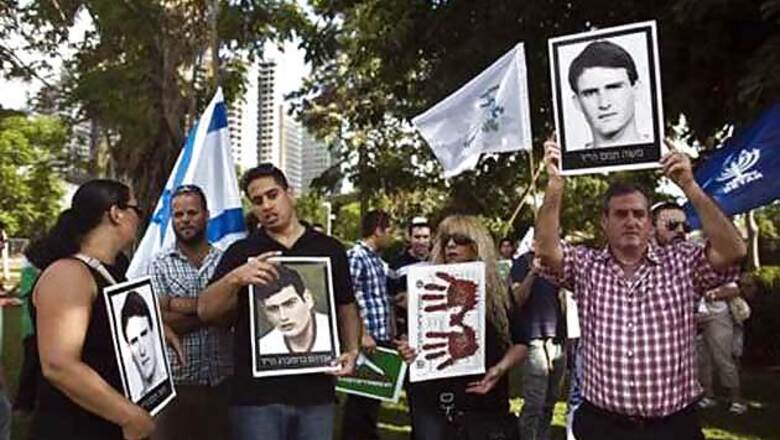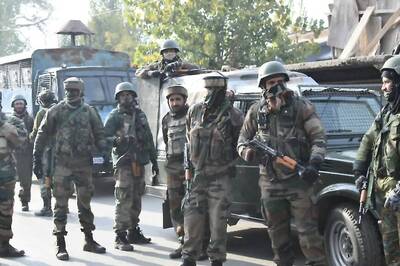
views
Israel named on Monday 26 Palestinians who it will free from jail this week under a deal enabling US-backed peace talks to resume, but the goodwill gesture was clouded by Israeli plans to expand settlements in the occupied West Bank.
The 26 prisoners are the first of a total of 104 that Israel has decided in principle to free as part of an agreement reached after shuttle diplomacy by US Secretary of State John Kerry to renew talks for Palestinian statehood.
The United Nations and the European Union condemned as illegal the Israeli plans announced on Sunday to expand Jewish settlements in the West Bank. The Palestinians said the settlements were aimed at provoking them to pull out of the peace talks.
Some Israelis reacted angrily to the release - scheduled for Tuesday or Wednesday - of the long-term Palestinian prisoners.
"Shame on the government and shame on the prime minister and his supporters," Zvia Dahan, whose father, Moshe Becker, was killed while tending his orange grove in Israel in 1994, wrote on Facebook. One of Becker's three killers is to be freed.
The decision to free the 26 prisoners, regarded as heroes by Palestinians and jailed as murderers by Israel between 1985 and 1994, was made late on Sunday.
Israel sweetened the deal for far-right members of its governing coalition on Sunday by announcing the plans to build 1,187 new dwellings for Jewish settlers in the occupied West Bank and parts of the territory it annexed to Jerusalem after the 1967 Middle East war.
Israel's Channel 10 television said another 900 units were planned for the Beit Jallah area near Bethlehem. An official in Prime Minister Benjamin Netanyahu's office said in response that the project was not yet under construction.
"Those who do these things are determined to undermine the peace negotiations, are determined to force people like us to leave the negotiating table," Palestinian chief negotiator Saeb Erekat told Reuters.
Kerry, during an official trip to Colombia, told reporters on Monday that the new settlements announced by Israel "were to some degree expected," and urged Israelis and Palestinians to move ahead with the peace talks.
"What this underscores is the importance of getting to the table, getting to the table quickly" and resolving disputes over settlements and other issues, Kerry said in Bogota.
"The United States of America views all of the settlements as illegitimate," Kerry added.
A spokesman for European Union foreign policy chief Catherine Ashton said: "Israeli settlements in the West Bank are illegal under international law and threaten to make a two-state solution to the Israeli-Palestinian conflict impossible."
Eduardo del Buey, spokesman for UN Secretary-General Ban Ki-moon, said that "settlements in the occupied territories are illegal, they have been and continue to be illegal."
Mark Regev, a spokesman for Netanyahu, said the new construction would take place in areas that Israel intends to keep in any peace agreement. "This in no way changes the final map of peace. It changes nothing," he said.
Some 500,000 Israeli settlers live in the West Bank and East Jerusalem amid 2.5 million Palestinians. Israel withdrew in 2005 from the Gaza Strip, which is now governed by Hamas Islamists opposed to permanent co-existence with the Jewish state.
Peace talks broke down three years ago in a dispute over settlement building. They resumed in Washington on July 30, with a second round due in Jerusalem on Wednesday and later in the West Bank.
Few expect the latest negotiations to resolve issues that have defied solution for decades, such as borders, settlements, Jerusalem and Palestinian refugees.
Washington, which pressed Palestinian President Mahmoud Abbas to return to the table, wants a deal within nine months.
With neighbouring Egypt and Syria in upheaval and with Israel facing the threat of a potentially nuclear-armed Iran, Netanyahu decided he could ill afford to alienate the United States, and led his pro-settlement government into the talks.
A list of the prisoners, along with the names of the people they were convicted of killing, was published by Israel's Prisons Service as part of a process in which opponents of their release have 48 hours to appeal to the High Court. Based on past decisions, the court is widely expected not to intervene.
"I cannot believe (it), no matter what anyone tells me, until I hold my son's hand. When I touch him, then I can say my son has come home," said Emtawe el Khor, whose son Fayez has been in jail since 1985, convicted of murdering an Israeli.
Fourteen of those going free will be deported or sent to the Gaza Strip, and 12 to the West Bank. Two would have completed their terms in six months, and six over the next three years.
Israel has a number of times freed Palestinians before they served out their time, but mostly in swaps for Israeli soldiers or their remains held by its enemies.
For Abbas, who has vowed to seek freedom for all Palestinian prisoners, the prospective release is a boost after years of failed talks with Israel. Many of the inmates were said to have been linked to his Fatah movement or one of its allies.




















Comments
0 comment